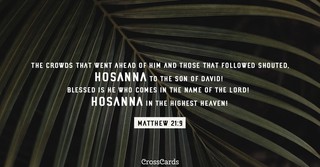
- Recent Translations
- All Translations
Matthew 21:23
Share
Settings
Matthew 21:23 Meaning and Commentary
And when he was come into the temple
The day following the cursing the fig tree: for the withering of it, and the notice the disciples took of it, and our Lord's discourse with them about it, were not in one and the same day, as is clear from the account the Evangelist Mark gives; but on the morning that Christ had conversed with his apostles by the way from Bethany to Jerusalem, concerning the strength of faith in prayer, and the success of it; when they were come into the city, and to the temple, whither he directly went, and entered upon his work of preaching to the people,
the chief priests and elders of the people came unto him.
The "chief priests" were not the high priest, and his "sagan", or deputy, but the principal of the priesthood, who were chosen from the rest of their brethren, to sit in the sanhedrim; and "the elders of the people" were the laity that were chosen from among the people, to be members of the same grand council: in this sense the Jewish writers interpret the word "elders", in ( Deuteronomy 21:2 ) "thy elders, and thy judges"; that is,
``thy elders, who are thy judges: it is a tradition, R. Eliezer ben Jacob says, (lwdgh Nyd tyb hz: Kynqz) , "thine eiders; this is the great sanhedrim" F1.''The other Evangelists Mark and Luke add to these, Scribes, who also were a part of this great assembly; so that the principal members of it, if not the whole sanhedrim, came in a body together, if possible, by their presence and authority, to daunt Christ, discourage his ministry, bring it into contempt with the people, and stop his proceedings and success. And this they did
as he was teaching;
the people, that is, preaching the Gospel to them, as Luke explains it: he was instructing them in the things relating to himself, and his kingdom, dispensing the mysteries of his grace, the doctrines of regeneration, justification, and salvation. Mark says, it was "as he was walking in the temple": and at the same time teaching the people, who flocked about him in like manner, as the Peripatetic philosophers taught their scholars walking: whence they had their name.
And said, by what authority dost thou these things?
that is, drive out the buyers and sellers out of the temple, which greatly provoked them, their own gain and interest being concerned therein; and perform these miracles of restoring sight to the blind, and causing the lame to walk; which he had very lately wrought in the temple; and particularly preach these doctrines, the work in which he was then engaged:
and who gave thee this authority?
They do not object to his doctrines, or dispute whether they were true or false; nor examine his miracles, whether they were of God, or of the devil: in these points they might fear he would be able to put them to silence and confusion, of which some of them had had an experience before; but they proceed in another way, in which they might hope for success, and attack him about his commission and authority under which he acted, whether he pretended to derive his authority from God, or from men: by this they designed to ensnare him and hoped they should gain their point, let him answer in what form he would. Should he say that God gave him the authority to do these things, they would charge him with enthusiasm and blasphemy, urging, that it was wickedness and presumption any man to pretend to be sent immediately from God; since the order of the priesthood, and of teaching was fixed, and none were to take upon them the office of a priest, or of a teacher of the people, but by their appointment; or none were called and sent, but through them, or by their means: and if he should say, that he had his authority from men, they would confront him, and absolutely deny that he had any from them, who only had the power of giving men an authority of preaching in the temple; wherefore he must be an usurper of this office, and a turbulent, seditious person, that sought to destroy all order, civil and ecclesiastical.
F1 T. Hieros Sota, fol. 23. 3. Jarchi in Deut. xxi. 2.

